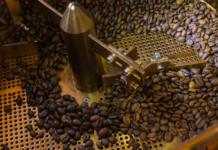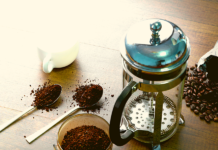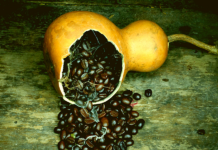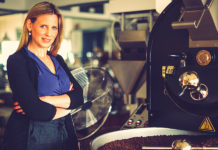Contents
Eating coffee beans has become a new trend now and if you are a devoted coffee lover, then you might have considered hitting your coffee addiction up another level.
Did you know that some people are eating coffee beans?
Yes, you read that right!
Although coffee is a loved beverage, some people also like to consume coffee as a snack. Weird? Or perhaps you already tried them yourself? Regardless, we have compiled everything you need to know about eating coffee beans!
Read More:
- Best Ground Coffees: All You Need To Know
- Best Coffee For Cold Brew
- Best Coffee On Amazon
- Best Bizzy Organic Coffee
- Best K Cup Coffees
- Best Coffee Liqueur
- Best Kona Coffees
- Best Dominican Coffees In 2023
- Best Cuban Coffees
- Best Dunkin Donuts Coffees
Coffee Beans Basic
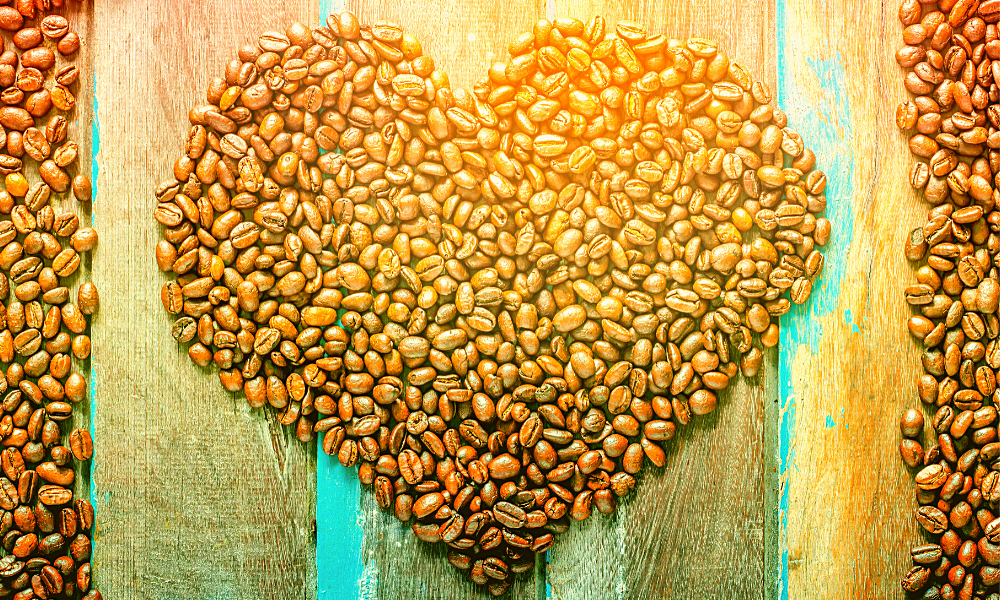

Before we start into the topic of eating coffee beans, it is important that you know what exactly coffee beans are. Little known to others, coffee beans are not really beans at all.
In fact, they are seeds.
The seed is within the coffee fruit. During coffee processing, the surrounding mucilage which the seeds are wrapped in is removed.
Coffee processing is the process of stripping away the gooey-like mucilage and outer fruit that surrounds the seeds. Once it is removed, the seeds are roasted to a specific amount and then packaged. During the roasting process, the tiny seeds start to expand and turn brown to the coffee beans we usually know.
Eating Coffee Beans: Can You?
So, going back to the topic, can you actually eat coffee beans?
Yes, of course!
Coffee beans are edible.
In fact, coffee addicts have been enjoying eating coffee beans for quite a while now. The popular idea of eating coffee beans has been around for a long time, way before drinking, and brewing coffee became the norm.
Coffee beans were usually mixed with animal fats in the past and consumed as a snack for boosting energy. Most individuals will snack on coffee beans while hunting, working, or traveling.
Today, there are several ways to turn the regular coffee beans into the savory snack one can munch on. Whether they are smothered in chocolate or roasted and sweetened.
Perhaps you have already seen the choco-covered coffee beans on the shelves or counter of your local supermarket or coffee shop. In general, this is the most popular way that most people enjoy them.
But…
How Does It Taste?
To be thorough, when we are talking about eating coffee beans, we consider both roasted and green beans.
Eating the unroasted, green coffee beans is an option, however, not everyone will love the taste. Green coffee beans are described as tasting woody or grassy and highly acidic without the caramelized flavors which emerged during the roasting process.
Plus, green beans are also very hard and can be quite difficult to chew. Thus, we do not recommend eating coffee beans that are unroasted and green.
The majority of coffee lovers, on the other hand, enjoy eating coffee beans that are roasted. The robust and bold flavor and somewhat gritty textures of the whole coffee beans will make any coffee addict’s mouth water.
The flavor, however, depends on the certain roast of the coffee beans themselves. From dark to light, choosing the roast will also decide how much flavor profile has been highlighted in the bean.
In general, the medium or darker roasts may be more enjoyable to eat since they have more robust flavors and richer with oils. Also, eating roasted coffee beans can be less tooth-cracking, even if they are still quite hard.
Now that you have a general idea of what eating coffee beans taste like, you might be wondering whether or not you would want to consume them.
Read More:
- Best Manual Coffee Grinders
- 10 Best Automatic Pour Over Coffee Maker
- Best French Press Coffee Makers
- Best 4 Cup Coffee Makers
- Best Electric Coffee Grinders
- Making Coffee Camping: The Ultimate Guide To Camp Coffee
- Best Keurig Coffee Makers
- Best Nespresso Espresso Machines
- 10 Best Under Cabinet Coffee Makers
- 10 Best Coffee Maker with Grinder Reviews
Eating Coffee Beans: Is It Healthy?


Yes and no.
Since you are eating coffee beans in its whole form, then you are going to receive much flavor as well as substance. Thus, there are some pros and cons that you need to know.
Eating Coffee Beans: The Pros
First off, let us take a look at some of the biggest benefits of directly eating coffee beans instead of grinding them for brewing
1) Antioxidants
Most of the acclaimed health benefits of the coffee stem from the beans’ high number of antioxidants. It is in the form of the chlorogenic acids. Such phenolic acid compounds have been proven to reduce the risk of heart diseases and decreasing inflammation.
Also, Americans get more antioxidants from drinking coffee than from any other beverage or food. Green arabica coffee beans have at least 150mg of antioxidants per gram, nearly doubling what green tea has.
However, nearly 50 – 70 percent if lost in roasting, while another portion is removed when coffee is brewing.
Thus, eating coffee beans that are still green or those that are lightly roasted can offer the most substantial amount of antioxidants.
2) Fiber
Coffee beans are also high in fiber. A serving of 30 coffee beans can provide about 3 grams of fiber or 10 percent of the daily recommended intake. In comparison, a freshly brewed cup of coffee has no fiber at all. So, by eating coffee beans instead of brewing it, you can increase your fiber intake.
Fiber benefits the body in several ways. For one, it bulks up a stool as it passes through your digestive tract which helps in preventing constipation. Also, fiber gives the feeling of fullness, even in small quantities. This makes it highly valuable for weight control and management.
3) Caffeine
When compared to drinking freshly brewed coffee, eating coffee beans can provide more caffeine. Also, it is better absorbed through the mouth’s mucous membranes.
Studies revealed that caffeine can help improve mental functioning and memory, which may help prevent type II diabetes and reduce fatigue.
Thus, the higher caffeine content can help those who are constantly working nonstop and keeping them energized for the whole day.
Read More:
- Best Ground Coffees: All You Need To Know
- Best Coffee For Cold Brew
- Best Coffee On Amazon
- Best Bizzy Organic Coffee
- Best K Cup Coffees
- Best Coffee Liqueur
- Best Kona Coffees
- Best Dominican Coffees In 2023
- Best Cuban Coffees
- Best Dunkin Donuts Coffees
Eating Coffee Beans: The Cons
So, now that you have an idea of the benefits of directly eating coffee beans, let us take a closer look at the dark side of eating coffee beans.
1) Too Much Caffeine
As mentioned before, eating coffee beans directly means you’re taking more caffeine than drinking a freshly brewed one.
Now, for those who are sensitive to caffeine or need to limit their caffeine intake such as breastfeeding or pregnant women or individuals with high blood pressure, eating coffee beans is a no-no.
Also, those suffering from anxiety or having difficulties in sleeping shouldn’t consume coffee beans directly.
2) Heartburn
For individuals with high sensitivity to acid, eating coffee beans can make it even worse. Coffee beans contain a number of substances along with their naturally occurring acids such as catechol and caffeine.
These substances are known to stimulate the production of stomach acid. So, when these are present in higher quantities, it can lead to painful heartburn and acid reflux.
3) Laxative Effect
The laxative properties of coffee are often considered beneficial. When amplified, however, they can present some serious problems. So, always be cautious when binging on your coffee beans in order to avoid uncomfortable situations.
4) Cholesterol
There’s some evidence suggesting that eating coffee bean can increase the production of LDL (low-density lipoprotein), also known as the bad cholesterol.
This is mainly because of the presence of 2 compounds— kahweol and cafestol. Both compounds are present in whole coffee beans 10 – 40 times greater than brewed coffee.
Although the link between coffee and cholesterol is not yet well established, it might be prudent to avoid eating coffee beans if high cholesterol is a major concern.
5) Taste
Regardless of how much you love a cup of bitter, pitch-black coffee, it’s still far cry from the grittiness and bitterness of crunching down on roasted coffee beans.
Not many people will advocate for either texture or taste of eating coffee beans. However, as mentioned before, there are several delicious ways to eat them.
The most recognizable one is choco-covered coffee beans. Although this definitely increases the deliciousness factor, it also boosts both the fat and sugar content. Another great option is to eat the unbrewed coffee grounds by adding them to baked goods or a nutrient-rich protein shake.
Preparing Coffee Beans For Eating
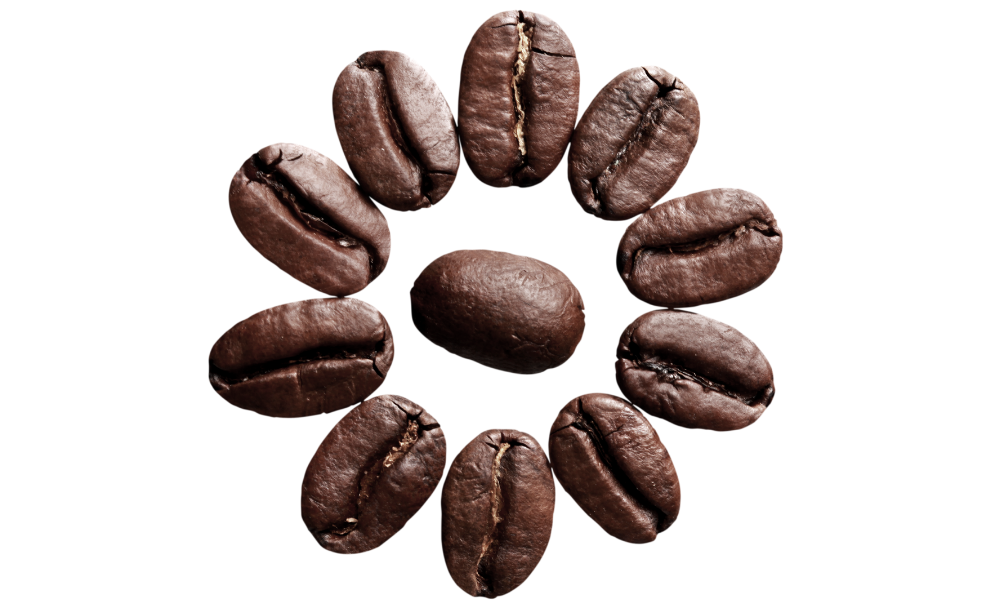

So, if you are interested in trying some delicious coffee beans at home, here are several recipe ideas for you to experiment with.
1) The Basic Beans
These are just good old fashion coffee beans. A few coffee junkies like to eat coffee beans exactly as they are. So, if you enjoy the simplicity of just eating the coffee beans, then you can skip the rigorous strep and choose your favorite roast then take a bite.
2) Choco-Covered Coffee Beans
Once again, this is the most loved recipe in the coffee eating world. It is basically two of the most addictive sweet treats in the world.
For this delicious treat, you will need:
- Chocolate
- Roasted coffee beans (dark and medium roasts are recommended)
- Baking tray
- Microwave
- Parchment paper
And here’s how you make it:
- First off, you need to break the chocolate up and melt it in the microwave.
- Once the choco has been melted, you can remove it from the heat and slightly let it cool.
- Start dipping your coffee beans in melted choco.
- Once the coffee beans have been covered, place them on the parchment paper on a baking tray.
- Place it in the fridge to cool for an hour or two.
- Once they have solidified, you can start snacking on them.
3) Dirty Chai Choco-Covered Coffee Beans
Now, this recipe is somewhat similar to the classic choco-covered coffee bean, however, it involves a variety of spices and herbs in order to give you a unique dirty-chair twist.
For this recipe, you’ll need:
- Ground cloves
- Black pepper
- ¼ teaspoon cardamom
- ½ teaspoon ginger
- 1 teaspoon cinnamon
- 1 cup roasted coffee beans
- 2 cups chocolate
The steps for whipping up these dirty chai choco-covered coffee beans are similar to the classic choco-covered coffee beans. The only difference is that you will be mixing the spices with the chocolate once melted.
Read More:
- Best Manual Coffee Grinders
- 10 Best Automatic Pour Over Coffee Maker
- Best French Press Coffee Makers
- Best 4 Cup Coffee Makers
- Best Electric Coffee Grinders
- Making Coffee Camping: The Ultimate Guide To Camp Coffee
- Best Keurig Coffee Makers
- Best Nespresso Espresso Machines
- 10 Best Under Cabinet Coffee Makers
- 10 Best Coffee Maker with Grinder Reviews
Frequently Asked Questions
Q: Are coffee grounds safe to eat too?
A: Yes. Just like eating whole coffee beans, it is also safe to consume coffee grounds, but in moderation.
Coffee grounds work better for those with sensitive teeth or do not enjoy chomping on the whole coffee beans.
Q: Can I feed coffee beans to pets?
A: In general, caffeine can be toxic and potentially fatal to cats and dogs, particularly animals of a smaller size.
Since pets are not dependent on caffeine to get through the day, a generous amount of caffeine can make them sick.
Also, although caffeine can provide some benefits to us, it actually has no health benefits for pets.
Q: Can eating coffee beans help with weight loss?
A: If you eat them in moderation and without any added sweeteners or sugars, then yes, eating coffee beans can help lose weight.
Eating a handful of coffee as a snack instead of popcorn, chips or choco can spare you a few extra unnecessary calories.
In addition, coffee beans have zero added sugars, fats, and carbs. Also, it only contains at least 10 calories per serving.
Plus, eating coffee beans is a great way to get your heart pumping and awakening your senses before working out. This provides an extra boost of energy which is useful for the whole day ahead of you.
Final Thoughts
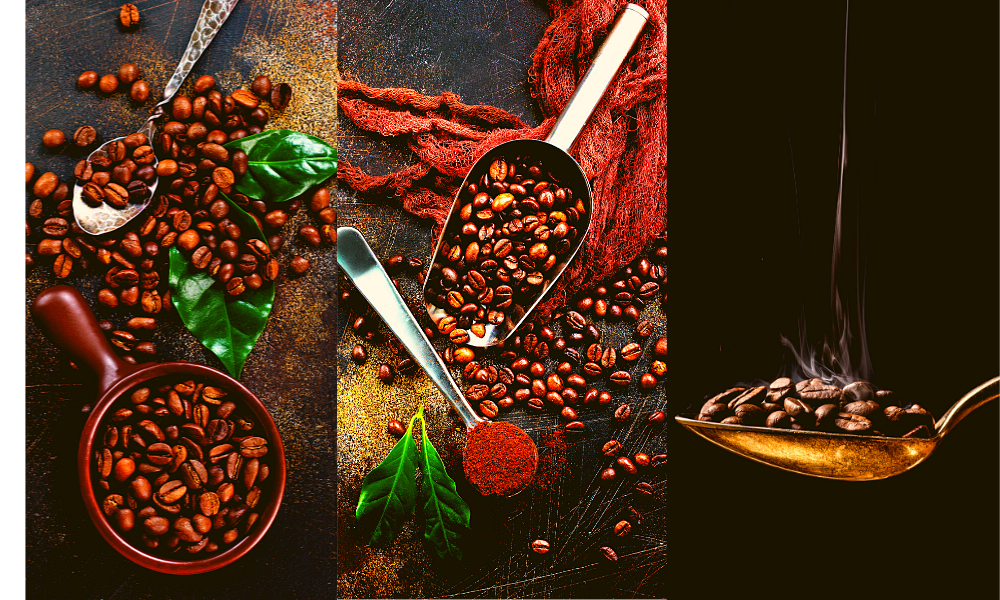

Read More:
- Best Ground Coffees: All You Need To Know
- Best Coffee For Cold Brew
- Best Coffee On Amazon
- Best Bizzy Organic Coffee
- Best K Cup Coffees
- Best Coffee Liqueur
- Best Kona Coffees
- Best Dominican Coffees In 2023
- Best Cuban Coffees
- Best Dunkin Donuts Coffees
At this point, you should know that coffee beans are definitely edible. Plus, they can offer more benefits than grinding and brewing them to your favorite morning cup. As long as the extenuating situations such as acid reflux, pregnancy, or high cholesterol are not a factor, then eating coffee beans are a healthy addition to your diet.
So, have you tried eating whole coffee beans? Do you like them dipped in chocolate or do you just take a bean or two from your coffee jar and nibble them as you go out the door? Ever tried snacking on the unroasted, green coffee beans?
Also, do you have a coffee recipe for snacking? Feel free to share it with the community through the comment section below. Also, don’t forget to share this article with your family or friends who are curious as to whether it is safe to eat coffee beans or not.
Until then, happy coffee snacking!



